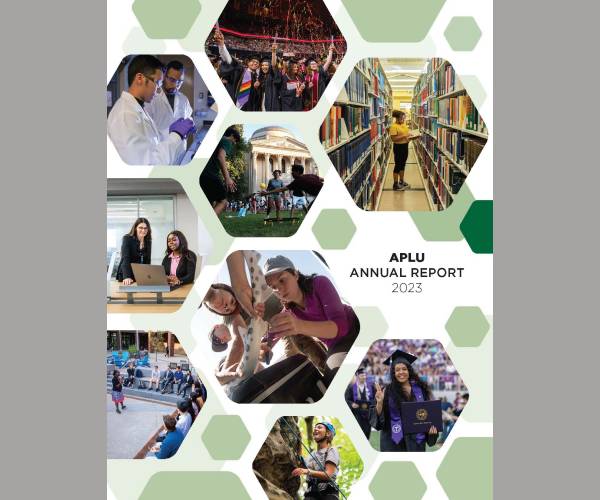Policy Blueprint: Advancing University-Engaged Economic and Social Prosperity
APLU released a policy blueprint for how public universities and the federal government can strengthen their partnership to build a modern workforce that meets the evolving needs of employers and collaborate on innovation while also becoming more effective partners with their communities to address local problems and foster opportunity and economic mobility.
 Universities and the federal government should take advantage of new opportunities to renew their commitment to driving national economic and social prosperity, according to APLU’s report, Advancing University-Engaged Economic and Social Prosperity.
Universities and the federal government should take advantage of new opportunities to renew their commitment to driving national economic and social prosperity, according to APLU’s report, Advancing University-Engaged Economic and Social Prosperity.
APLU calls on public universities and the federal government to take specific actions in:
- Building a thriving rural America;
- Meeting the demand for 21st century talent and skills;
- Securing American leadership in advanced manufacturing;
- Stimulating and accelerating university-based innovation and entrepreneurship; and
- Fostering equitable, inclusive economic opportunity and mobility
The longstanding partnership between public research universities and the federal government has led to a globally competitive economy and vibrant communities. The report includes nearly 50 recommendations universities and the federal government should undertake to strengthen economic and community development.
Educational institutions often serve as anchors in their regions. In many areas of the country, colleges are the key to holding the community together, with the support of other partners including federal, state and local government agencies. The APLU report notes that universities and their federal partners should seize the opportunity to strengthen a long-standing partnership to bolster economic mobility across the nation ranging from rural America to urban metropolises.
APLU’s Commission on Economic and Community Engagement (CECE) convened a working group that led to the development of the report’s recommendations. The working group was co-chaired by Amanda Wintersteen of Penn State University and Lawrence Molnar of the University of Michigan and included university-based experts working on economic development and community engagement.
Members of the CECE Public Policy Working Group were as follows:
- Jorge Atiles, Oklahoma State University
- Glynda Becker, Washington State University
- Rena Cotsones, Northern Illinois University
- Angela Philips Diaz, University of California-San Diego
- Tim Franklin, New Jersey Institute of Technology
- Matthew Hebb, Dalhousie University
- Catherine Howard, Virginia Commonwealth University
- Valerie O. Paton, Texas Tech University
- Ashley Stokes, Colorado State University
- Margaret Traband, University of Toledo
- Arnold Weinfeld, Michigan State University
- Chad Wootton, Texas A&M University
Questions regarding the paper may be directed to Shalin Jyotishi. Have responsibility for planning, executing, or communicating economic or community engagement impact at an APLU member institution? Join the Commission on Economic and Community Engagement.




Stay Connected
X (formerly Twitter)
Facebook
YouTube
LinkedIn
RSS